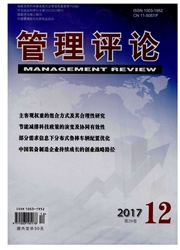

 中文摘要:
中文摘要:
本文沿着行为分析进路、运用实验经济学方法研究序贯决策中的信息瀑布现象及其行为匹配,率先分离了序贯决策中的决策行为——贝叶斯法则决策、非贝叶斯法则决策和平衡。设计了包含被试类型、备选集对称性等设置的序贯决策实验,结果表明,备选集对称性和决策序位等因素对决策者的行为方式和效率影响显著,被试类型、累积损益等因素的影响不显著;受禀赋效应和模糊规避的影响,平衡状态下决策者对私人信息赋予了较高权重。对序贯决策行为进行全面分析,分离出信息瀑布行为,并厘清其发生机理和决策特征及效率,这对理解和治理银行挤兑、网络群体性事件、金融危机等现象有着重要的理论和现实意义。
 英文摘要:
英文摘要:
Using the behavioral analysis approach and the experimental method, this paper researches the information cascades and behavior matching of sequential decision-making, and divides sequential decision-making behaviors into three classes : Bayes rule decision, non-Bayes rule decision and balance. And then, we design specific experiments which include four treatments such as different subjects' types, symmetry and asymmetry urns. Results show that symmetry & asymmetry urns and decision order have significant effect on behav- ior pattern and efficiency, while subject' s types, cumulative profit or loss do not. What' s more, subjects prefer to make decision based on their private signals under balance condition because of endowment effect and ambiguity aversion. In this paper, we analyze sequential decislon-maklng behaviors comprehensively and separate information cascades from them to find out the mechanism, characteristic and efficiency of information cascades. It has important theoretical and practical significance for understanding phenomena such as the bank run, the network group events and financial crisis.
 同期刊论文项目
同期刊论文项目
 同项目期刊论文
同项目期刊论文
 期刊信息
期刊信息
